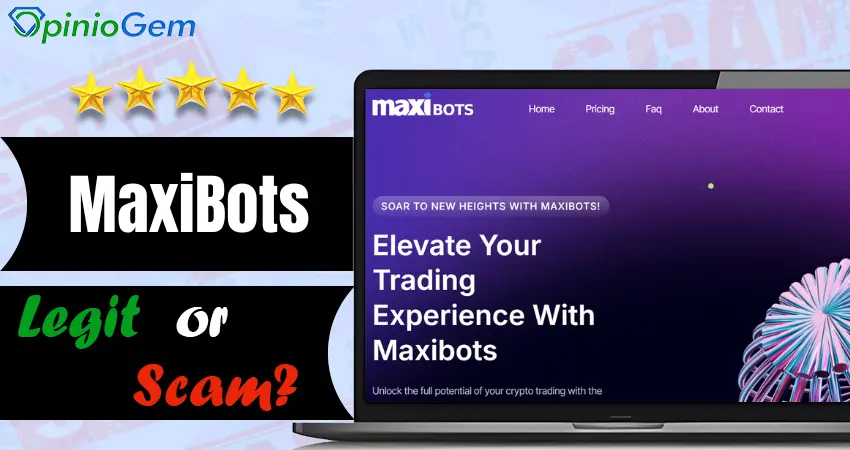MaxiBots says it can change the way people trade crypto using automated bots. But with some serious warning signs, it’s important to ask: Is MaxiBots a real investment, or is it just another scam? This review will help you decide.
What is MaxiBots?
MaxiBots claims to be a crypto trading platform that uses automated bots to make profits.
The company says that if you invest in their different packages, you can earn daily returns of 1% to 2.1%, depending on how much you invest.
These promises are attracting both new and experienced investors who are looking for easy money.
At first, MaxiBots might seem like the perfect solution for making money with little effort. But when you look closer, there are some big concerns.
For one, there’s no information about who runs MaxiBots. You don’t know who you’re giving your money to, which makes it hard to trust them.
Also, MaxiBots is not transparent about how it operates. The website doesn’t show any active users, bots, or real data.
Even though it claims a 100% satisfaction rate, there’s no proof to back this up. This lack of evidence makes the site’s credibility questionable.

Our Opinion
Based on what we found, MaxiBots has a lot of red flags that suggest it might be a scam.
First, there’s no real information about the people behind it. When you invest your money, you want to know it’s going to trustworthy people, not hidden operators.
The investment plans are also a big concern. Promising up to 2.1% returns every day is almost impossible in real financial markets.
Even the best traders can’t consistently get these kinds of returns. The fact that MaxiBots claims to do this without any risk is very suspicious.
Another warning sign is that there’s no proof of external income. MaxiBots says it makes money through crypto trading, but there’s no evidence of that.
It looks like the only way MaxiBots makes money is through new investments, which is a sign of a Ponzi scheme.
When new investments stop coming in, the platform will likely fail, and most investors will lose everything.
MaxiBots also has an affiliate program that raises concerns.
The focus on getting new investors instead of actual trading shows that MaxiBots is more interested in bringing in new money than in providing real financial services.
The six-level commission structure, which offers up to 18% in commissions, is another sign that the platform depends heavily on recruitment.
In conclusion, MaxiBots seems like a risky platform that looks a lot like a Ponzi scheme.
The unrealistic promises, lack of transparency, and reliance on new investments suggest it might collapse soon. We strongly recommend not investing in MaxiBots.
What to Do If You Get Scammed
If you’ve put money into MaxiBots and think you’ve been scammed, take action quickly. Here’s what you should do:
- Stop Investing: Don’t put any more money into the platform. Even if they promise higher returns, it’s probably a trick.
- Withdraw Your Money: Try to take out any money you have left in MaxiBots. Scams often make it hard to withdraw money as they near collapse, so act fast.
- Report the Scam: Let your local financial authorities know. In the U.S., contact the Federal Trade Commission (FTC) or the Securities and Exchange Commission (SEC). You should also tell your bank or credit card company if you used their services.
- Keep Records: Save all emails, transaction receipts, and screenshots. This will help when filing complaints or trying to get your money back.
- Find Support: Join online forums or groups that help scam victims. These can provide advice, support, and sometimes legal help.
- Talk to a Lawyer: If you lost a lot of money, consider getting legal advice. A lawyer can help you understand your options and possibly recover your funds.
In summary, MaxiBots is a risky platform with too many warning signs to be trusted. If you’ve already invested, act quickly to protect your money.
Always be careful with investment opportunities, especially when they seem too good to be true.
If you’ve received an email about the Katz Privacy Settlement, you might be wondering if it’s legit or just another scam.



[…] Octobits Trading Bot Scam was based on a bot that claimed to make crypto trading easy and […]